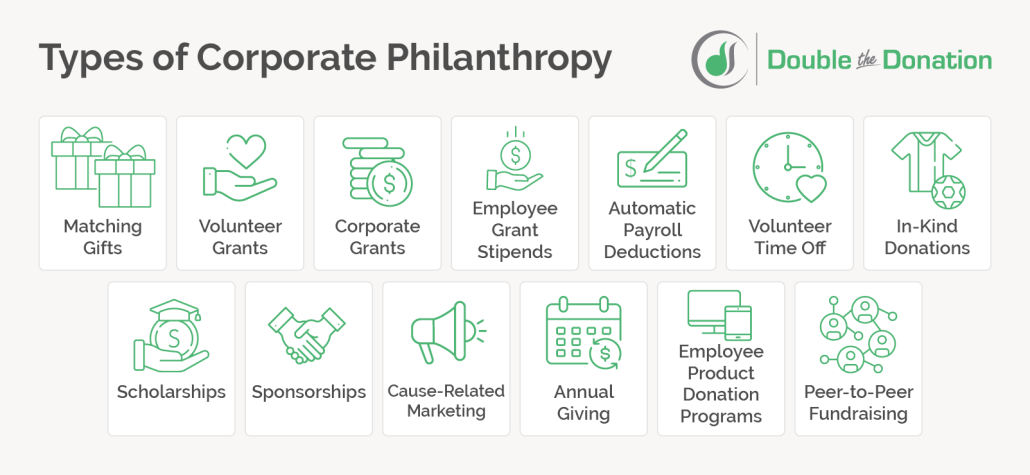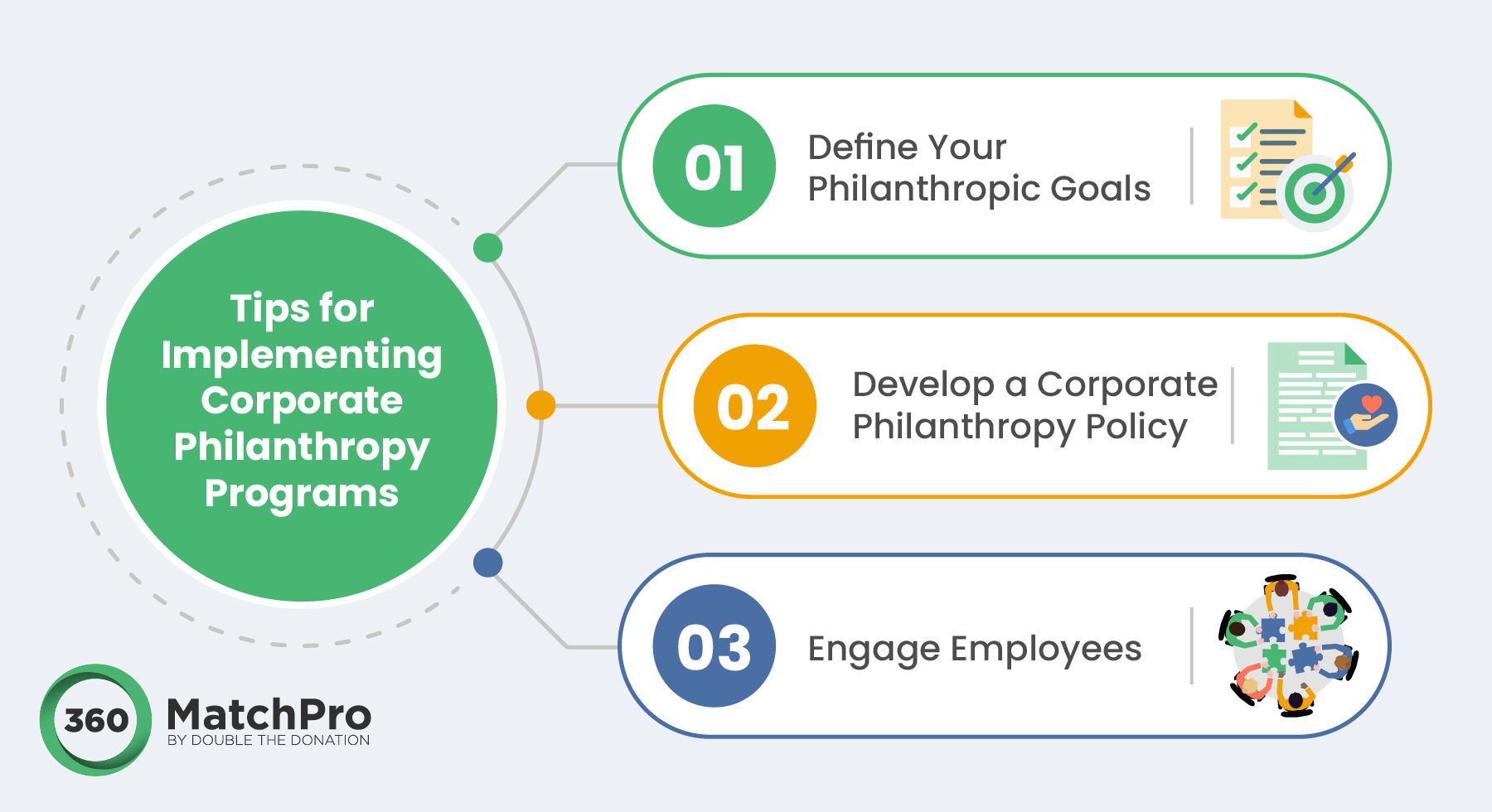Checking Out How Company Philanthropy Shapes Brand Name Credibility and Customer Commitment
Business philanthropy significantly influences brand name track record and customer commitment. Business that participate in genuine philanthropic initiatives usually see a favorable shift in just how consumers perceive them. This placement of worths promotes trust and psychological connections with target markets. Nevertheless, the effectiveness of these kind efforts can differ substantially. Understanding what absolutely resonates with customers is vital for brand names seeking to boost their social impact and market placement. What techniques will become important for future success?
The Advancement of Business Philanthropy
As organizations increasingly acknowledge their duty in society, the advancement of corporate philanthropy has changed from mere charitable contributions to a strategic element of brand name identity. At first, firms participated in philanthropy mainly for tax obligation advantages or to enhance their public picture. Gradually, this strategy shifted as stakeholders-- including workers, financiers, and consumers-- required a much more genuine dedication to social duty.
Organizations started straightening their kind campaigns with their core worths and organization objectives, resulting in more thoughtful and impactful contributions. This modification has motivated business to buy lasting methods and neighborhood advancement, promoting a sense of function that resonates with consumers.
Furthermore, technological developments have facilitated transparency and engagement, permitting organizations to showcase their philanthropic efforts better. Consequently, company philanthropy has actually become an integral component of service technique, with organizations welcoming the chance to favorably affect culture while improving their overall brand name narrative.
The Effect of Philanthropy on Brand Assumption
While companies take part in philanthropic initiatives to promote social great, these initiatives substantially shape brand name perception among customers. Business philanthropy can boost a brand's picture by associating it with positive social influence and community participation. Customers typically perceive brands that proactively participate in charitable tasks as even more trustworthy and accountable. This assumption can influence acquiring choices, as customers may like brand names that demonstrate a commitment to social problems.

Building Emotional Connections With Offering
Company philanthropy acts as a powerful tool for enhancing brand identity by connecting company worths with area demands. Via strategic giving, companies can promote neighborhood interaction and create common worths that resonate with consumers on an emotional level. This technique not only enhances brand track record but likewise builds long lasting connections between businesses and their stakeholders.
Enhancing Brand Identity
They not just add to societal good but additionally build much deeper emotional connections with their target markets when business engage in philanthropic initiatives. By straightening their brand with charitable reasons, companies improve their identity and signal worths that reverberate with consumers. This alignment develops a narrative that exceeds product or services, inviting consumers to join a common mission. As customers progressively prioritize purpose-driven brand names, business that actively take part in providing can differentiate themselves in a jampacked market. Such efforts foster a feeling of loyalty amongst clients who really feel personally attached to the brand's worths. Eventually, corporate philanthropy comes to be a necessary tool for boosting brand identification, cultivating long-term partnerships based on common beliefs and psychological engagement.
Fostering Area Interaction
Countless research studies suggest that companies involving in community-focused philanthropic efforts can considerably enhance emotional links with their stakeholders. By investing in neighborhood projects and sustaining social reasons, services grow a sense of belonging and depend on within the community. This interaction cultivates a positive brand photo, as customers appreciate business that show genuine worry for social issues. Employees commonly really feel more pleased and determined to be connected with a company that focuses on area well-being. Because of this, consumers are most likely to establish loyalty in the direction of brand names that proactively add to purposeful reasons. Inevitably, cultivating area engagement through philanthropy not only improves brand track record however likewise develops enduring psychological ties that benefit both the neighborhood and the company it serves.
Creating Shared Worths
Just how can organizations properly develop common values that resonate with their stakeholders? Companies can achieve this by straightening their humanitarian efforts with their core mission and the interests of their communities. By participating in campaigns that attend to regional needs, businesses cultivate psychological connections with consumers, boosting brand name loyalty. For example, partnering with non-profits that mirror shared values strengthens the brand name's picture and demonstrates dedication to social duty. In addition, transparent interaction regarding these efforts permits stakeholders to see the concrete impact of their payments. Ultimately, by incorporating shared worths into their corporate philanthropy, business not only boost their track records but additionally cultivate long-term connections with consumers, leading to increased commitment and trust. This positioning is important in modern-day consumer decision-making.
Instance Studies: Effective Philanthropic Campaigns
Examining effective philanthropic campaigns discloses various approaches that enhance brand name reputation. Impactful neighborhood campaigns, innovative collaboration versions, and long-term interaction strategies have confirmed effective in promoting favorable connections with customers. These study highlight the importance of thoughtful corporate providing in attaining both social and business objectives.
Impactful Neighborhood Initiatives
Several companies have effectively leveraged philanthropic campaigns to improve their brand name reputation while making a significant effect in their areas. An innovation firm introduced an electronic proficiency program in underserved communities, giving training and sources that encouraged neighborhood homeowners. This campaign not just added to area growth yet additionally placed the firm as a socially liable leader. In a similar way, a significant food business carried out an appetite alleviation project, partnering with regional nonprofits to distribute meals to families in need. This effort strengthened community connections and cultivated client loyalty. Through these impactful campaigns, firms have actually demonstrated their commitment to social duty, properly straightening their brand name values with the needs of the areas they offer, eventually enhancing their total online reputation.
Cutting-edge Collaboration Models
The success of impactful community campaigns typically rests on cutting-edge collaboration models that combine varied stakeholders to deal with facility social difficulties. Case researches show how firms, non-profits, and government entities can team up successfully. As an example, an international corporation partnered with a neighborhood non-profit to release an education program, merging resources and proficiency to boost community proficiency rates. An additional example included a technology company and a medical care organization joining pressures to create a telemedicine service for underserved populaces. These collaborations not only magnified the reach of kind efforts however additionally reinforced the brands' track records by straightening their missions with neighborhood demands. Ultimately, ingenious collaboration versions work as a catalyst for significant modification and foster stronger links between brands and their consumers.
Long-lasting Interaction Approaches

Determining the ROI of Corporate Social Duty
As business progressively purchase company social duty (CSR) efforts, understanding the roi (ROI) linked with these efforts becomes crucial. Determining ROI in CSR is multifaceted, often incorporating both qualitative and measurable metrics. Monetary returns can be evaluated via boosted sales, enhanced brand name loyalty, and boosted employee spirits, which can result in greater efficiency. Additionally, business may examine cost financial savings linked to lasting practices, read review such as lowered waste or energy intake.
Qualitatively, the impact of CSR on brand name reputation can be reviewed through customer perception research studies and social media sites belief evaluation. Surveys can supply understandings into just how CSR activities influence consumer loyalty and count on. Benchmarking versus market criteria can help companies gauge their CSR efficiency - corporate philanthropy. Ultimately, an extensive technique to gauging ROI makes it possible for firms to make enlightened decisions regarding future CSR financial investments, straightening techniques with both monetary efficiency and social influence
Consumer Expectations and Corporate Obligation
Progressively, customers anticipate firms to operate with a strong sense of corporate obligation, checking out moral techniques as a requirement for brand name commitment. This change in assumption reflects a growing awareness of social and environmental issues, leading customers to favor brands that align with their values. Consumers are more inclined to support companies that participate in clear techniques, show sustainability, and add favorably to their areas.
Social media enhances these assumptions, permitting consumers to share their experiences and point of views swiftly. Brands that fall short to satisfy these ethical criteria run the risk of backlash, while those that welcome business responsibility usually take pleasure in improved reputation and consumer loyalty. As customers demand liability, business must incorporate corporate social obligation into their core methods, prioritizing moral behavior not simply as a marketing approach, however as a basic aspect of their procedures. This alignment can inevitably lead to more powerful brand name affinity and continual success in competitive markets.
Future Patterns in Company Philanthropy and Brand Loyalty
The landscape of business philanthropy is advancing, influenced by the intense consumer expectations bordering corporate obligation. Firms are increasingly integrating social influence right into their core company approaches, not merely as a supplementary task. Future fads indicate a shift towards openness, with brand names sharing comprehensive info concerning their philanthropic initiatives and their direct impacts on areas.
Modern technology is playing a crucial role, allowing real-time interaction in between brand names and customers. Social media site systems promote straight interaction, permitting customers to articulate their assumptions and hold brand names answerable. In addition, more youthful generations, specifically Millennials and Gen Z, focus on sustainability and moral techniques, driving organizations to take on even more diligent techniques.
As business philanthropy ends up being associated with brand identity, firms that authentically straighten their goals with social needs are most likely to foster more powerful customer commitment. This convergence of worths will ultimately shape the future of business online reputation and consumer connections in a progressively diligent marketplace.
Frequently Asked Inquiries
Just How Do Customers Discover a Firm's Philanthropic Initiatives?
Consumers discover a firm's kind efforts through numerous Clicking Here networks, including social media sites, news release, neighborhood events, and word-of-mouth. These methods assist in awareness, making it possible for people to engage with brand names that line up with their rate of interests and worths.
What Function Does Employee Participation Play in Business Philanthropy?
Staff member participation in corporate philanthropy boosts interaction, fosters a feeling of ownership, and enhances team communication - corporate philanthropy. This participation often magnifies the impact of philanthropic initiatives, causing greater recognition and support for the business's kind efforts
Can Corporate Philanthropy Backfire on a Brand name's Credibility?
Company philanthropy can certainly backfire on a brand name's reputation if viewed as opportunistic or insincere. Unfavorable public assumption may occur, bring about decreased depend on and commitment among consumers who focus on credibility in corporate actions.
Are Smaller Business as Reliable in Philanthropy as Larger Corporations?
Smaller business can be similarly reliable in philanthropy as larger corporations, typically showing dexterity and credibility. Their local efforts may resonate much more deeply with neighborhoods, cultivating real links despite limited resources compared to their larger counterparts.
Exactly How Can Business Select the Right Triggers to Assistance?
Business can pick the appropriate trigger by straightening their worths with area demands, assessing stakeholder interests, and evaluating potential impact. This strategic approach fosters authenticity, enhances engagement, and strengthens links with consumers and the more comprehensive area.
While firms involve in humanitarian efforts to promote social excellent, these campaigns greatly form brand name assumption amongst consumers. As consumers significantly focus on purpose-driven brands, companies that actively involve in providing can distinguish themselves in a crowded market. Many firms have effectively leveraged humanitarian campaigns to boost their brand name credibility while making a meaningful influence in their neighborhoods. Increasingly, customers anticipate companies to run with a strong sense of company obligation, seeing moral practices as a requirement for brand commitment. As business philanthropy becomes identified with brand identification, business that authentically align their goals with societal demands are likely to cultivate stronger consumer loyalty.